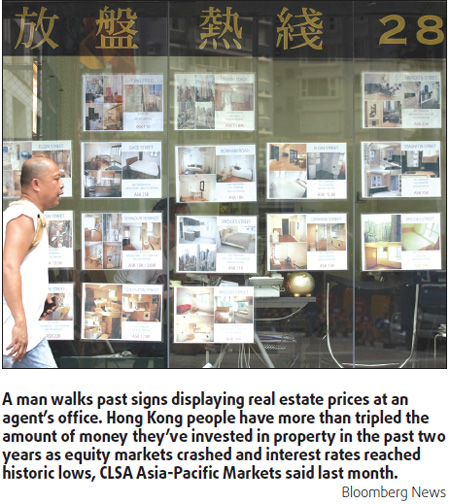A balancing act for bubble-wary leaders on a policy tightrope
Updated: 2009-10-30 07:46
By George Ng(HK Edition)
|
|||||||

HONG KONG: The Hong Kong government is performing a delicate job of suppressing a potential property bubble in the city.
Hot money, as a result of global "quantitative easing", is sending local home prices soaring, with luxury market prices surging over 40 percent from the end of last year and topping peak levels during the last bubble period in 1997, with prices in the mass market also jumping, nearly 30 percent.
Meanwhile,the economic recovery inches along in the slow-lane, with the unemployment rate stuck at a several-year high of 5.3 percent and wages forced to wait in "park".
This obvious disconnect between surging home prices and economic torpor has increasingly raised concerns about a potential bubble in real estate markets, which - if it develops and implodes - will ineluctably inflict a calamity on the local economy as the last bubble did in late 1990s.
After the bubble burst in 1997, property prices plunged as much as 70 percent from their peaks.
As a result, over 100,000 middle-class families - about one tenth of home owners in the city - found themselves trapped in a financial nightmare and quagmire, because of which they owed banks more than the market value of their mortgaged homes.
These so-called negative-asset mortgagers had to tighten their belts and live an impoverished life for several years because banks - for the sake of risk management - squeezed every spare cent out of the hapless homeowners' pockets to make up the deficit. The economy was battered and lame for several years as consumption, which accounted for around 60 percent of the GDP, slumped precipitously.
In an attempt to prevent a recurrence of such a burst-bubble calamity, the government has taken steps to cool the booming property market.
Under the mantle of safeguarding banks from potential credit risks, the government has instructed lenders to tighten their credit to buyers of luxury homes.
The Hong Kong Monetary Authority (HKMA), the city's de facto central bank, asked banks last Friday to lend up to only 60 percent of market value to buyers of homes costing HK$20 million or more, down from 70 percent previously, while it imposed a HK$12 million cap on such loans.
While most commentators believe the move is more symbolic than pragmatic as high-end home buyers usually have piles of cash in their coffers and rarely borrow up to the cap, the government's initial move has had a perceptible psychological impact on the market.
Home transactions dropped as much as 30 percent, while home prices declined about three percent during the long weekend just after the HKMA took action, on worries about further government moves, data from real estate agents show.
In another effort to cool the market, the government has also resorted to rhetorical tactics, with Financial Secretary John Tsang leading the chorus.
The government would intervene in the property market if it became "unfair" and "unhealthy", affecting the overall economy and people's livelihoods, the secretary warned in a meeting with developers on Wednesday, without elaborating.
Despite all the moves and gestures made, the government has tactically played a balanced game so far, avoiding any harsh measures that might trigger a collapse of the property market.
"The government must be prudent when implementing policies aimed at cooling down the property market, particularly under the current economic situation that still sees some uncertainties," Secretary Tsang told legislators yesterday.
With this underlying concern in mind, the government will very likely stick to its moderate approach. It is unlikely that the government will take any drastic action, including playing its long-touted trump card - increasing the land supply -unless property prices get out of hand.
In the meantime, as the city's leaders try to rein in property price gains and keep buyers, lenders and sellers on a tighter leash, the government will have to gingerly walk a very challenging policy tightrope to maintain the market's balance.
(HK Edition 10/30/2009 page3)